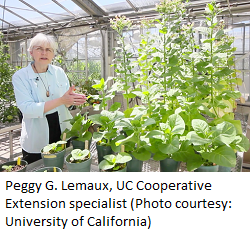 You can’t smoke it … well, you SHOULDN’T smoke it … but you might be able to burn it. A researcher from the University of California is working on getting more oils out of tobacco plants so it can serve as a feedstock for biodiesel, providing a green fuel source while finding a market for tobacco growers without it harming people’s health.
You can’t smoke it … well, you SHOULDN’T smoke it … but you might be able to burn it. A researcher from the University of California is working on getting more oils out of tobacco plants so it can serve as a feedstock for biodiesel, providing a green fuel source while finding a market for tobacco growers without it harming people’s health.
Peggy G. Lemaux, UC Cooperative Extension specialist, and Anastasios Melis and Krishna Niyogi, Agricultural Experiment Station faculty in the Department of Plant and Microbial Biology at UC Berkeley, are lead researchers in the project.
“There are several reasons we are modifying tobacco to produce biofuel,” Lemaux said, “It is a high biomass crop. If you want to extract oil, then the more biomass you have, the more oil you get. And, since tobacco is not a food source, tobacco production for biofuel would not have an impact on global food markets or find its way into the food supply. Finally, tobacco farmers are anxious to produce a product that is more acceptable to the public.”
The article goes on to say how the researchers are using algae genes to help the tobacco plants produce more oil. A commercially viable method is still in the distance, but Lemaux is optimistic. The school received a three-year $4.8 million grant from a U.S. Department of Energy to conduct the research.

